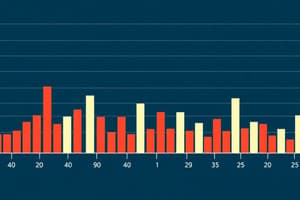Podcast
Questions and Answers
What is Section 2.2 Homework?
What is Section 2.2 Homework?
Section 2.2 Homework
What should be the sum of the relative frequencies after constructing a relative frequency distribution summarizing IQ scores of college students?
What should be the sum of the relative frequencies after constructing a relative frequency distribution summarizing IQ scores of college students?
If percentages are used, the sum should be 100%. If proportions are used, the sum should be 1.
Identify the class width, class midpoints, and class boundaries for the given frequency distribution (Daily Low Temperature in degrees °F).
Identify the class width, class midpoints, and class boundaries for the given frequency distribution (Daily Low Temperature in degrees °F).
Class width: 3; Class midpoints: 41, 44, 47, 50, 53, 56, 59; Class boundaries: 39.5, 42.5, 45.5, 48.5, 51.5, 54.5, 57.5, 60.5.
Identify the class width, class midpoints, and class boundaries for the given frequency distribution (Height in inches).
Identify the class width, class midpoints, and class boundaries for the given frequency distribution (Height in inches).
Does the frequency distribution appear to have a normal distribution? Explain.
Does the frequency distribution appear to have a normal distribution? Explain.
How to solve for a relative frequency table?
How to solve for a relative frequency table?
How to solve for a cumulative frequency distribution?
How to solve for a cumulative frequency distribution?
What characteristic of data is a measure of the amount that the data values vary?
What characteristic of data is a measure of the amount that the data values vary?
_______ are sample values that lie very far away from the majority of the other sample values.
_______ are sample values that lie very far away from the majority of the other sample values.
A _______ helps us understand the nature of the distribution of a data set.
A _______ helps us understand the nature of the distribution of a data set.
Class width is found by _______.
Class width is found by _______.
In a _______ distribution, the frequency of a class is replaced with a proportion or percent.
In a _______ distribution, the frequency of a class is replaced with a proportion or percent.
Why does it not make sense to construct a histogram for the population of ages at inauguration of all U.S. Presidents who had professions in the military?
Why does it not make sense to construct a histogram for the population of ages at inauguration of all U.S. Presidents who had professions in the military?
The heights of the bars of a histogram correspond to _______ values.
The heights of the bars of a histogram correspond to _______ values.
The bars in a histogram _______.
The bars in a histogram _______.
A histogram aids in analyzing the _______ of the data.
A histogram aids in analyzing the _______ of the data.
A _______ histogram has the same shape and horizontal scale as a histogram, but the vertical scale is marked with relative frequencies instead of actual frequencies.
A _______ histogram has the same shape and horizontal scale as a histogram, but the vertical scale is marked with relative frequencies instead of actual frequencies.
A(n) _______ distribution has a 'bell' shape.
A(n) _______ distribution has a 'bell' shape.
What characteristic distinguishes a Pareto chart from a bar chart?
What characteristic distinguishes a Pareto chart from a bar chart?
A(n) _______ uses line segments to connect points located directly above class midpoint values.
A(n) _______ uses line segments to connect points located directly above class midpoint values.
A _______ is a graph of each data value plotted as a point.
A _______ is a graph of each data value plotted as a point.
We utilize statistical _______ to look for features that reveal some useful or interesting characteristics of the data set.
We utilize statistical _______ to look for features that reveal some useful or interesting characteristics of the data set.
A _______ is a plot of paired data (x, y) and is helpful in determining whether there is a relationship between the two variables.
A _______ is a plot of paired data (x, y) and is helpful in determining whether there is a relationship between the two variables.
Which of the following is NOT true about statistical graphs?
Which of the following is NOT true about statistical graphs?
In a graph, if one or both axes begin at some value other than zero, the differences are exaggerated. This bad graphing method is known as _______.
In a graph, if one or both axes begin at some value other than zero, the differences are exaggerated. This bad graphing method is known as _______.
When drawings of objects are used to depict data, false impressions can be made. These drawings are called _______.
When drawings of objects are used to depict data, false impressions can be made. These drawings are called _______.
Which of the following is a common distortion that occurs in graphs?
Which of the following is a common distortion that occurs in graphs?
Why is it important to learn about bad graphs?
Why is it important to learn about bad graphs?
Flashcards are hidden until you start studying
Study Notes
Relative Frequency Distribution
- The sum of relative frequencies must equal 100% if using percentages or 1 if using proportions.
Frequency Distribution Characteristics
- Class width is calculated by subtracting the lower limit of a class from the next consecutive lower class limit.
- Class midpoints are the average of the upper and lower boundaries of each class.
- Class boundaries extend half a unit below the lower limit and half a unit above the upper limit to avoid gaps between classes.
Histogram Analysis
- A histogram displays frequency values with bars that touch, indicating continuous data.
- The shape of the distribution can be analyzed through a histogram, which can signify a normal distribution if frequencies rise to a peak and then decline symmetrically.
Outliers and Variation
- Outliers are sample values significantly different from the majority of data and can affect the overall analysis.
- Variation measures how much data values differ from each other within a dataset.
Relative Frequency and Cumulative Frequency
- Relative frequency distributions replace actual frequencies with proportions or percentages.
- Cumulative frequency distributions summarize data by showing the total counts up to the upper boundary of each class.
Types of Graphs
- Frequency polygons connect points over class midpoints to visualize frequency distributions.
- Dotplots display data values as individual points, illustrating distribution characteristics clearly.
- Scatter-plots show relationships between paired data (x,y), indicating correlations or trends.
Statistical Graph Best Practices
- Pareto charts arrange bars in descending order of frequency, highlighting more significant categories effectively.
- Common issues in statistical graphs include nonzero axes that exaggerate differences and pictographs that can mislead interpretations.
- Understanding bad graphing methods, like representing one-dimensional data with two-dimensional objects, is crucial for critical analysis of data representation.
Understanding Distribution Shapes
- A normal distribution is characterized by a bell shape, indicating a symmetrical spread of data around a central mean.
Importance of Accurate Representation
- Analyzing graphs critically is essential to avoid misleading interpretations of data, emphasizing the importance of correct statistical practices in presentations and reports.
Studying That Suits You
Use AI to generate personalized quizzes and flashcards to suit your learning preferences.




